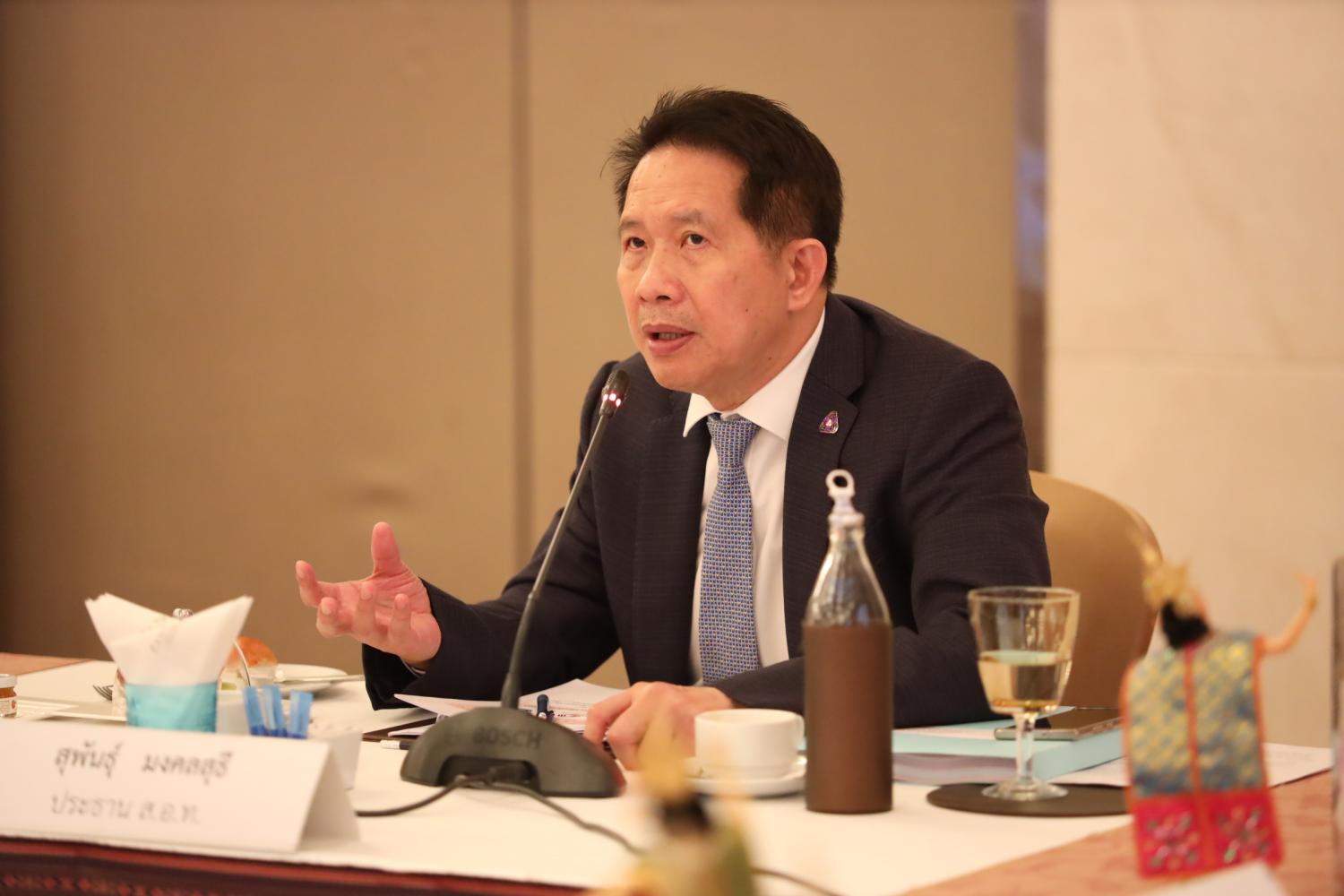
Less than a month after the second wave of the pandemic subsided, Thailand faced a tsunami of Covid-19 infections in April and early May, posing a threat to economic stability.
While countries with high inoculation rates such as the US have moved past rigid measures, the Thai government has stumbled in providing vaccination.
The state also faces fund disbursement challenges related to the 380-billion-baht budget allocated to combat Covid-19.
The tighter virus control measures announced last week in Thailand put more pressure on the government to help those in urgent need, as it has come under fire for its failure to manage the health crisis.

Somchai Lertsutiwong, chief executive of Advanced Info Service (AIS), Thailand's biggest mobile operator by subscribers.
RAPID REMEDY REQUIRED
Nonarit Bisonyabut, a senior research fellow at the Thailand Development Research Institute, said without a third wave of Covid-19 infections in the country, he would have disagreed with the government's cash handout scheme.
"The third wave is serious, setting highs for new infections and deaths. We are still unsure whether or when the government will be able to contain the outbreak," he said.
"People who cannot work from home are the hardest hit. The cash handouts help with their short-term financial hardships and are considered essential."
However, Mr Nonarit suggested this round of cash handouts be given to a specific target group who deserve special attention from the government given its limited budget.
"The new round of handouts should concentrate primarily on state welfare cardholders and underprivileged people who could not register for assistance, such as those without smartphones or bedridden patients," he said.

FTI chairman Supant Mongkolsuthree says 240 billion baht is not sufficient to deal with all the impact from three waves.
"Combined, this group comprises 16-17 million people."
Mr Nonarit said the government is projected to spend about 60 billion baht a month if it pays 3,500 baht a month to this group in need.
Of the government's budget of 380 billion baht available to mitigate the impact of the pandemic, cash handouts are projected to be sustainable for six months.
The cash handout is projected to last for four months if the government intends to offer cash to all eligible recipient groups estimated at 33 million people under existing aid measures.
Mr Nonarit referred to epidemiological evidence that suggests this wave of infections will last for around 4-6 months.
In addition to outlining a clearer target group, it is imperative for the government to come up with clear guidelines for use of the cash handouts, he said.
Mr Nonarit proposed the government allow the handouts to be used to purchase goods and services online, promoting social distancing and preventing congestion at small retailers.
He acknowledged the cash handout schemes alone are insufficient to shore up the country's economy during the pandemic, suggesting the government desperately needs to support local businesses, especially small and medium-sized enterprises (SMEs) to curb rising unemployment.
Mr Nonarit said the government could easily distinguish affected businesses by comparing records of their corporate income tax or value-added tax payments from 2019, before the pandemic emerged, with those from 2020 when the outbreak began to spread.
He also advised setting up certain criteria such as a percentage of recorded decrease in sales to determine which businesses should be allowed to participate in the state aid or subsidy programmes.

Phichet Rerkpreecha, chief executive of Line Thailand, said the government should lend a hand to the private sector's push to provide vaccinations. Wichan Charoenkiatpakul
MORE AMMUNITION ANTICIPATED
The Federation of Thai Industries (FTI) predicts the state may eventually borrow more money when the 240 billion baht allocated by the government for economic restoration is taken into consideration.
This portion of funds is part of the 380-billion-baht package.
"I believe the government must request more loans or it risks the economy slowing down further," said FTI chairman Supant Mongkolsuthree.
He said the 240 billion baht would not be enough to deal with all the impacts caused by the three waves of the pandemic.
But the government must first stop the spread of the virus and restore confidence by vaccinating people against Covid-19, said FTI vice-chairman Kriengkrai Thiennukul.
Even though authorities have not re-imposed draconian lockdown measures, including a curfew, most people have already entered into their own "self-lockdown" mode, restricting themselves to their homes as they do not dare go out for fear of contracting the virus, he said.

Tassapon Bijleveld, executive chairman of Asia Aviation, said the keys to economic recovery are sufficient vaccine procurement and timely financial remedy for those in need. Pattarapong Chatpattarasill
"This is not the right time to stimulate the economy. We need to control the outbreak first," said Mr Kriengkrai.
Tassapon Bijleveld, executive chairman of Asia Aviation, the largest shareholder of Thai AirAsia, said the keys to economic recovery are sufficient vaccine procurement and a timely financial remedy for those in need.
The priority is to secure vaccines from manufacturers by all means, no matter how high prices surge, and inoculate people as soon as possible, he said.
If the government commits to vaccinating 300,000 people a day, it should execute that plan by prioritising groups to receive the jabs first to minimise potential risk, said Mr Tassapon.
In addition to health personnel on the frontline, teachers should be the next priority for inoculation to allow schools to resume in-person classes, he said.
Once teachers are vaccinated, it reduces the risk exposure for students at school, who could transmit the virus to their family members when they return home.
To complete these urgent tasks, the government needs to seek a higher budget from additional loans, as the remaining budget from the 1-trillion-baht loan decree allocated last year is likely to fall short, said Mr Tassapon.
"If new loans do not destabilise the economy, the government should not hesitate to secure them to help reduce the financial burden of those suffering from the impact of the pandemic," he said.
Existing measures are not strong enough to save SMEs from peril, particularly the debt moratorium scheme that does not waive monthly interest, said Mr Tassapon.
As long as operators have to pay monthly interest, this means a higher debt burden because interest will accumulate while their business suffers, and the principal remains the same.
He suggested the government extend more practical financial relief measures, such as providing grace periods for both monthly instalment payments and interest for a year to give people breathing space.
"Large companies like [Thai AirAsia] are not as much of a concern because we have more capabilities to maintain our business," said Mr Tassapon.
"But SMEs and those living hand-to-mouth need an urgent remedy."

TCC chairman Sanan Angubolkul comments on the co-payment subsidy that are continued this year.
HELP THE SMALLER FISH
Somchai Lertsutiwong, chief executive of Advanced Info Service, Thailand's biggest mobile operator by subscribers, said the government's coffers are still ample and should be used to help people affected by the pandemic.
The people affected should receive government financial aid every time strict measures are issued to control the pandemic, particularly those without bank accounts or those working in an informal business, he said.
The financial assistance needs to be directly distributed to the affected people, not through project-based schemes, to ensure the help is effective, said Mr Somchai.
He said people breaking rules set to curb the pandemic must be severely punished.
Moreover, the government and businesses must heed lessons learned from last year's outbreak and come up with approaches for how to deal with the ongoing crisis. Bigger organisations should lend a hand to smaller ones, helping them to survive, said Mr Somchai.
"The big fish must help the small fish, not eat them," he said.
The pandemic has taken a toll on every sector and it is imperative for every organisation, particularly the large and powerful ones, to step up and cooperate, said Mr Somchai.
He suggested the government provide sufficient doses for up to 70% of the country's population, in line with guidelines recommended by the World Health Organization.
Mr Somchai said the government should offer clear measures to support SMEs so they can recover.
Phichet Rerkpreecha, chief executive of Line Thailand, said the government should lend a hand to the private sector's push to provide vaccinations.
"It could be helpful if the government can find ways to motivate or incentivise private companies to provide vaccines for their employees," he said.
"The more vaccines that can be privately funded, the more people we can vaccinate and the faster Thailand will recover."
Mr Phichet pointed to vaccination as the key to economic recovery. Although vaccine distribution is a challenge, "we need to work together as a nation to do this right".

A woman walks past a large sign at a shop stating it is participating in the Rao Chana (We Win) scheme and the Khon La Krueng (Half-Half) co-payment scheme at Chatuchak weekend market. Pornprom Satrabhaya
TECH-LED BACKING FOR JABS
He said communication plays an important role in this crisis.
"Precise information in an organised and timely manner will be the key to managing the public's expectations," said Mr Phichet.
"Collaborations with the private sector will increase the effectiveness of vaccine distribution and communications."
The Public Health Ministry introduced the "Mo Phrom" (Doctors are ready) Line official account (OA) to enable people to register and reserve a place in the queue for vaccination.
The booking facility on the platform began on May 1.
He said technologies can provide solutions to manage the situation.
"There are 'ready to use' tools available from many platforms. I am sure all the platforms are willing to assist the government in overcoming this crisis," said Mr Phichet.
Patama Chantaruck, vice-president for Indochina expansion and managing director of IBM Thailand, said many countries still face unprecedented levels of infection due to virus mutation.
"The public sector and companies need to rethink their use of shared spaces to keep employees and citizens safe," she said.
"Even with approved vaccines, the need remains to scale proactive testing and health credentialing in a cost-effective and decentralised way."
Through decentralisation, individuals can control their health data using trustworthy credentials to support access to shared spaces, said Ms Patama.
She said health credentials, such as certification of recent Covid-19 testing or vaccination status, can play an important role as countries return to normalcy.
"Access to these credentials can be scaled and secured in a transparent way that preserves privacy," said Ms Patama.
Dhanawat Suthumpun, managing director at Microsoft (Thailand), said the pandemic has led to faster digital adoption.
In Thailand, the public sector needs greater agility to handle highly unpredictable situations, and this can be achieved with a digital-first mindset, said Mr Dhanawat.
Technology can be used to develop a holistic, end-to-end view of vaccine management, in a similar way to supply chain management.
He said people can reduce the need for physical contact by using an online platform for remote interaction between patients and health workers, while chatbots can relieve the human workload and increase efficiency in sharing information with the public.
"Data has become the new oil in our world, and it is time to make the best use of it by sharing and integrating data from various sources," said Mr Dhanawat.
"The resurgence of Covid-19 has brought back widespread remote working, and digital productivity continues to grow more important for business continuity. Cybersecurity will continue to be a major issue as people, data and devices are quickly and widely decentralised to keep businesses moving."

AS GOOD AS IT GETS
Kulaya Tantitemit, director-general of the Fiscal Policy Office, defended the government's economic measures to cope with the pandemic-induced crisis, noting they are identical to those applied in many other countries.
Thailand's measures match the country's available budget and economic conditions, said Ms Kulaya.
"State measures to combat the impact of the outbreaks are extensive and not significantly distinctive from the aid measures introduced by other countries," she said.
All countries have rolled out measures covering fiscal and monetary components to help relieve the hardships of their people and businesses, said Ms Kulaya.
Likewise on social assistance, most countries have similar policies in the form of cash transfers, food coupons, utility fee payment reductions or delays, she said.
In terms of social insurance, there has been unemployment compensation, leave without pay and labour market intervention via a state subsidy to employers to retain employees and upgrade their workers' skills.
The Thai Chamber of Commerce applauds the government for its spending efforts to restore the economy, even though the financial injections cannot offset the damage caused by the pandemic.
The pandemic is estimated to have cost Thailand 1.195 trillion baht last year, with the government fighting back using its 1-trillion-baht loan decree, leading to a shortfall of nearly 200 billion.
Chamber chairman Sanan Angubolkul believes the government funnelled money to the right groups of people -- low- and high-income earners -- in a timely manner.
"The state actions were not slow. The government launched relief measures during the 2020 lockdown and introduced stimulus packages in September and October," he said.
Some measures, such as the co-payment subsidy scheme, have continued this year.
Government attempts to deal with unemployment were also admirable, said Mr Sanan, with the unemployment rate last year standing at 1.5%, or around 700,000 to 800,000 people.
"The government provided the right cures, but the economy faced a high level of damage," he said.
The third wave of Covid-19 dealt a further blow to Thailand, and the authorities must work to stimulate the economy again, as soon as next month, said Mr Sanan.
He said the budget of 380 billion baht to cope with the pandemic impact is sufficient because the damage caused by the outbreak should not exceed 400 billion if the government can get disease transmission under control this month.
